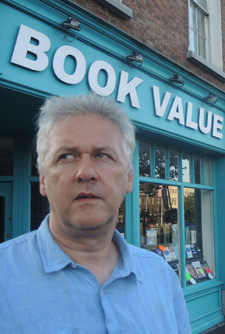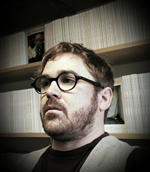Rooms of Consciousness:
stephen e. leckie in Conversation
with Patrick Warner

Malahat editorial assistant stephen e. leckie talks with Patrick Warner about "Anne Sexton" and "Psalms," his contribution of two poems to the latest Winter issue of the Malahat.
Read a review of Warner's latest collection of poems, Perfection, on our Book Reviews page.
Patrick, thank you for taking the time to chat. Your two poems, “Anne Sexton” and “Heartfelt Psalm” are featured in the 2014/15 Winter Issue #189 of the Malahat. What lead you to submit these poems? How long were they with you?
These two poems were probably sitting in my blue folder (having passed through my red folder) for a couple of months before I sent them along to the Malahat. I’m not a good judge of my own work, at least initially, and the interval between the time I submit and hear back from a journal’s editors is an enforced cooling off period. Having poems read, and ultimately accepted or rejected, by a variety of editors is an essential component in educating me about what is working and what isn’t working in my poems. I welcome criticism and editorial judgement when I am trying to shape a new book.
In “Anne Sexton,” you are presumably raising the spirit of the American poet, yet, are you also speaking to an aesthetic space accessible to all poets? Is the “light” and “silence” specific to Anne in the unfolding narrative of the poem?
You are right on both counts: the experience of “light” and “silence” applies to Anne Sexton as a poet and also to poets generally. And it’s even more widespread than that. I would say it applies to an aspect of what we call consciousness, both in humans and in animals.
I was struck by the lines: “All words are profane in this pedagogical / silence (which is the antithesis of violence)” (18-19). This statement comes after an absolution, and then the poem's figure “basks” (17) in a calm stillness. Is there a presence, absent of language, that teaches her? How fleeting is this “warm room” (16)?
I think there are many rooms in consciousness. There is the everyday in which the rational mind attempts to deal with the huge sensory input that is sweeping over us at any given moment, even in sleep. Then there is something that I think of as the mind within the mind, the place where we dump problems and questions and let them simmer while we get on with the rest of our lives. This most creative place is largely inaccessible to us until it has done its work. And we know when its work is finished because it interrupts or intrudes on our everyday consciousness; we are suddenly prompted with the answer to a question. If you are a poet, the answer may arrive as a metaphor, an image or a rhythm; a businessman may receive a new method of organization; a scientist may suddenly arrive at a new hypothesis. These are eureka moments when it sometimes feels as though someone is whispering in your ear. But to get back to the experience of “light” and “silence;” this is still another aspect of consciousness, one that language can’t really touch at all. This is a place of profound change—the kind of change that can come about through trauma—but it is not traumatic, it’s ecstatic. This is the place in the poem that I refer to as the “warm room.” You ask how fleeting it is? I’d say very fleeting for most of us, something we experience mostly as a memory.
“Heartfelt Psalm” creates a sacred space for the speaker to separate oneself from “pressures” (9) and the “selfish” (11). The mechanical images paired with the spiritual seem to experiment with the modern and an essential fullness of the “soul” (8). How did this poem come into being? Does it endeavour to answer the speaker's questions or just create more?
This poem is really about being hungover. Funnily enough, my first chance to read it to a group was at Poetry Weekend in Fredericton a couple of years ago. It was a Sunday morning and a good number of the congregation were in the right state of mind to receive it. One of the things that people seek in alcohol and drugs is a way to break out of crushing routines, obsessions even. It’s a way of stepping out of one’s life for a few hours. With that comes a change of perspective. If creativity is the bright side of the moon, then getting high is the dark side—the gates of ivory rather than the gates of horn.
What are you currently reading?
Just finished Martin Amis’ unnerving and brilliant new novel, The Zone of Interest. I’m now dipping into Thomas Hardy's poems. Recent memorable reads include Alexandra Oliver’s excellent Meeting the Tormentors in Safeway, and Richard Greene’s equally excellent Dante’s House.
Does your role as a librarian inspire your poetic practice?
All the time. It positively interferes. I work in a building that contains over a million books.

stephen e. leckie
* * * * * * * *









